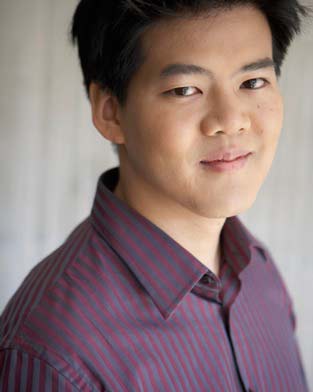Next story: Van Morrison - Keep It Simple
Winston Choi: Enter the Canadian
by Jan Jezioro
On Friday, April 18 at 8pm, the exciting young Canadian pianist Winston Choi will perform a solo recital at Asbury Hall in Babeville on Delaware Avenue in downtown Buffalo.
Choi, laureate of the 2003 Honens International Piano Competition and winner of France’s 2002 Concours International de Piano 20e siècle d’Orléans, regularly performs in recital and with orchestra throughout North America and Europe. He is especially dedicated to the premiering and commissioning of works by young composers as well as performing the masterworks of the past. He has collaborated with contemporary composers including William Bolcom, Elliott Carter, Brian Ferneyhough, Bright Sheng, Christian Wolff, Chen Yi, and John Zorn. Choi’s debut CD of the complete piano works of Elliott Carter (l’Empreinte Digitale in France) was awarded the highest rating of five stars by BBC Music Magazine. Having previously taught at Oberlin Conservatory, he is currently Instructor of Piano at Bowling Green State University.
The Yvar Mikhashoff Trust is sponsoring the event, its second annual concert for new music. The New York State Council on the Arts (NYSCA), an organization that supports new music year-round at Hallwalls, is also sponsoring the event. The use of the Steinway Grand Piano is being donated in part by Denton Cottier & Daniels of Getzville, and Asbury Hall is being used as the concert venue courtesy of Babeville and Righteous Babe Records.

The late Yvar Mikhashoff (1941-1993) is perhaps best known as a pianist with a tremendous mastery of technique, coupled with a flamboyant style, who was also a new music advocate and entrepreneur. Mikhasoff, however, was also a composer of a considerable and varied body of work. Elemental Figures, a trilogy of piano pieces, occupied him in his final years and has never before been performed in its entirety. His avowed goal was to compose a work continuing the grand line of instrumental virtuosity, which, in his estimation, ended with Ravel’s Gaspard de la Nuit (1908).
It will be a very special evening of music-making in the grand tradition, then, when Winston Choi performs Ravel’s monumental three-part Gaspard de la Nuit, in this, the centennial year of its composition, as well as giving the first complete performance of Yvar’s Elemental Figures, which was directly inspired by the form and poetical allusions of the earlier work by Ravel.
Ravel is very often labeled an impressionist composer of dreamy visions of an antique world long past, which is certainly a part of his legacy. Many listeners to this, the more popular side of his music, seem to have forgotten that Ravel sometimes composed in an altogether different vein. He also had a daring, experimentalist side, perhaps best exemplified in Miroirs and his revolutionary and demanding 1908 composition, Gaspard de la Nuit.
Unlike many of the composers who pushed the boundaries of piano composition, Ravel was not himself a virtuoso on the instrument. Nevertheless, he observed that one of his objectives in composing Gaspard was to create greater challenges for the pianist than Balakirev had done in Islamey, his “Oriental fantasy,” considered by some to this day to be the most difficult work ever written for the instrument.
Gaspard de la Nuit was inspired by a book of the same name by the French author Aloysius Bertrand 1807-1841, a work that contained prose poems, drawings, and verses relating to fantasies of devils, ill-fated lovers and death and nightmares. Ravel selected three of Bertrand’s fantasies as patterns for musical treatment, and had the texts printed in the score. In Ondine, a water fairy seduces an observer to accompany her on a visit to her kingdom at the bottom of a deep lake. Le Gibet describes the uneasily eerie experiences of a person looking at a hanging course. Scarbo, the final movement, features the scampering movements of a tiny fiend, first appearing then disappearing, scaring someone in their own bed. The apparitions’ uneven flight, hitting and scratching against the bed, while casting a huge shadow in the moonlight, creates a nightmarish scene for the person lying in his bed. The superhuman technical demands of the work are effectively employed by Ravel to achieve an extraordinary poetic evocativeness.
Besides featuring the world premiere of Elemental Figures, another of Mikhasoff’s works, Choi will perform Portrait of Madame Butterfly.
The evening’s program also includes Night Fantasies, a work composed between November 1978 and April 1980 by Elliott Carter, the dean of contemporary American composers, who will himself be 100 years old on December 11 of this year. Carter composed Night Fantasies between November 1978 and April 1980, and all the manuscript material dealing with the composition of the work is housed in the Paul Sacher Foundation archives in Basel, Switzerland. According to the Paul Sacher Foundation catalog, there are 1001 pages of sketches for Night Fantasies. Choi has recorded Night Fantasies on his CD of the complete piano works of Carter.
Whether or not the number of preserved manuscript pages has any relationship to the number of tales in the fabled literary work known as the 1001 Arabian Nights is unknown. What can safely be predicted, however, is that Winston Choi must himself be a masterful musical storyteller to have included this work on an already dauntingly difficult program.
Also on the program, Affulgat sol omnibus animalibus dei, a work by the young, Toronto-based Canadian composer Brian Current, which will receive its area premiere.
Asbury Hall at Babeville, 341 Delaware Avenue (854-1694/hallwalls.org). $15 general admission, $10 members, students, and seniors.
blog comments powered by Disqus|
Issue Navigation> Issue Index > v7n15: Best of Buffalo 2008 (4/10/08) > Music > Winston Choi: Enter the Canadian This Week's Issue • Artvoice Daily • Artvoice TV • Events Calendar • Classifieds |









 Current Issue
Current Issue